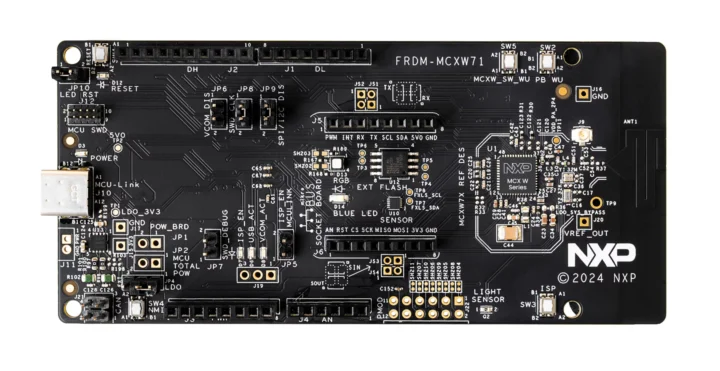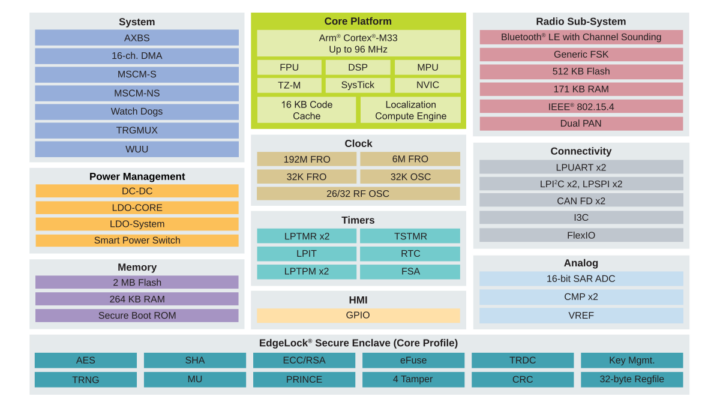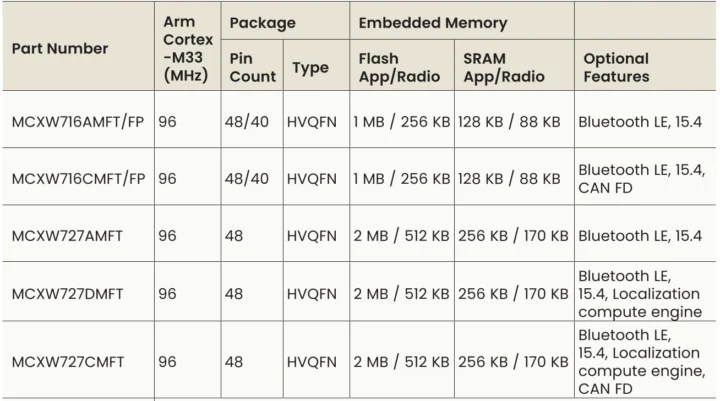NXP MCX W72x series Cortex-M33 wireless SoCs support for Bluetooth 6.0 and an 802.15.4 radio for Zigbee, Thread, and Matter. The MCX W72x family also implements Bluetooth Channel Sounding for accurate distance measurements with the help of a Localization Compute Engine (LCE) to reduce latency.
It’s the second MCU part of the MCX W wireless family following the MCX W71x MCU, and the new MCX W72x wireless microcontroller is offered with up to 264 KB SRAM, 2MB flash, features a dedicated Cortex-M33 core to handle Bluetooth and 802.15.4 radios, implements an EdgeLock Secure Enclave for security, and integrates plenty a range of I/Os in a 48-pin package.
NXP MCX W72x key features and specifications:
- MCU cores and memory/storage
- Application core – Arm Cortex-M33 core up to 96 MHz with 2 MB program Flash with ECC, 264 kB SRAM with ECC and parity
- Networking core – Arm Cortex-M33 core with dedicated 512 kB flash and 171 kB dedicated SRAM
- Security core – Arm Cortex-M0+ core
- Radio subsystem
- 802.15.4 radio compliant with IEEE 802.15.4-2015
- 101 dBm 250 kbps receive sensitivity
- Improved enhanced ACK timing support in the 802.15.4 hardware
- Dual PAN support
- Bluetooth 6.0
- Up to 24x simultaneous hardware connections in any central/peripheral combination
- Rx Sensitivity
- 106 dBm @ 125 kbit/s long-range
- 102 dBm @ 500 kbit/s long-range
- 97.5 dBm @ 1 Mbit/s
- 95 dBm @ 2 Mbit/s
- Bluetooth Channel Sounding with integrated Localization Compute Engine (LCE) to reduce ranging latency
- Tx output power – up to +10 dBm
- Data rates: 125 kbit/s, 500 kbit/s, 1 Mbit/s and 2 Mbit/s
- Modulation types – 2-level FSK, GFSK, MSK, GMSK
- On-chip balun with single-ended bidirectional RF port
- 802.15.4 radio compliant with IEEE 802.15.4-2015
- Peripherals
- 2x low-power UART (LPUART) modules
- 2x low-power SPI modules
- 2x low-power I2C (LPI2C) with SMBus support, 1x MIPI I3C
- 2x optional FlexCANs with CAN and CAN FD supporting CAN 2.0, Part B
- 1x programmable FlexIO module supporting emulation of UART, I²C, SPI, Camera IF, LCD RGB, PWM/ waveform generation
- Up to 29x GPIO
- Analog
- 16-bit single-ended SAR analog-to-digital converter (ADC) up to 2 Msps
- 2x high-speed analog comparators (CMP) with 8-bit digital-to-analog converter (DAC)
- Voltage reference – 1.0 V to 2.1V
- Timers
- 2x 6-channel 32-bit timers (TPM) with PWM capability and DMA support
- 2x 32-bit low-power timers (LPTMR) or pulse counters with compare features
- 4-channel 32-bit low-power periodic interrupt timer (LPIT) with DMA support
- 1x 56-bit timestamp timer
- 32-bit seconds real-time counter (RTC) with 32-bit alarm and independent power supply
- Signal frequency analyzer (SFA) provides facilities for measurement of clock period/frequency as well as time between triggers
- System Peripherals
- DC/DC converter supporting buck and bypass operating modes
- Asynchronous DMA controller with per-channel access permissions (secure/non-secure)
- Wake-up unit for power-down modes
- Security – EdgeLock secure enclave, core profile
- Support for Edgelock 2GO cloud-based certificate deployment and management
- Secure boot and debug
- Symmetric key encryption – AES-128/192/256 and ECB, CBC, CTR, GCM, CMAC, and CCM modes
- Asymmetric key encryption – ECC NIST P–192/224/256/384/521, Curve25519
- Key exchange algorithms – ECDH(E), SPAKE2+, JPAKE
- Secure key generation, storage, and management
- Flash access protection and optional encryption on-the-fly decryption using a PRINCE XEX block cipher mode
- Supply Voltage – 1.8 V to 3.6 V
- Packaging – 48QFN, 7×7 mm, 29 GPIO
- Temperature Range – -40°C to 125°C
- AEC-Q100 qualification with industrial grade

The MCX W72x MCU family is supported by the MCUXpresso suite with an SDK with connectivity stacks and examples, tools for pin, clock, peripheral, security, and memory config tools, support for multiple IDEs such as MCUXpresso for VS Code, MCUXpresso IDE, or IAR Embedded, and security programming and provisioning tools.
The FRDM-MCXW72 development board and MCX-W72xx-EVK full evaluation kit are also coming soon, but right now, information is limited, and I can only find low-resolution photos on the Zephyr Project’s documentation website. NXP says the 48-pin versions of the MCX W71x and MCX 72x devices are pin-to-pin compatible.
There will be three MCXW72x parts with the MCXW727AMFT, MCXW727DMFT, and MCXW727CMFT joining a few MCX W71x SKUs as shown in the table above. While the MCX W72x can get AEC-Q100 qualification, NXP is also working on the KW47 family specifically to bring Bluetooth 6.0 Channel Sounding to the automotive market. Two direct competitors of the MCX W72x are the Nordic Semi NRF54L15, now found in Bluetooth 6.0 + 802.15.4 modules, and Silicon Labs MG24, also Bluetooth 6.x certified.
Both the KW47 and MCX W72 microcontrollers are sampling today, and mass production is scheduled for December 2025. Developers can start working using development tools and reference designs for the KW45 and MCX W71 microcontrollers. Visit the product page for the MCX W72x family for additional information.

Jean-Luc started CNX Software in 2010 as a part-time endeavor, before quitting his job as a software engineering manager, and starting to write daily news, and reviews full time later in 2011.
Support CNX Software! Donate via cryptocurrencies, become a Patron on Patreon, or purchase goods on Amazon or Aliexpress. We also use affiliate links in articles to earn commissions if you make a purchase after clicking on those links.




